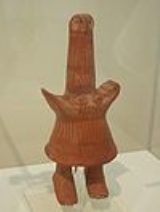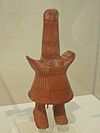
Athena and Phevos
Encyclopedia
"Athena" and "Phevos" were the Olympic mascots of the 2004 Summer Olympics
, held in Athens
. The pair are one of the few examples of anthropomorphic mascots in the history of the Olympics. According to the official mascot
webpage, “their creation was inspired by an ancient Greek doll and their names are linked to ancient Greece, yet the two siblings are children of modern times - Phevos and Athena represent the link between Greek history and the modern Olympic Games.”
The mascots were named after the Greek gods
(Athena
) and (Apollo
). Phevos is a transcription of the modern Greek pronunciation of Phoebus, an epithet of Apollo
. They were loosely modeled after an archaic Greek terra cotta
daidala from the 7th century BC (below left), which was recommended by curators at the National Archaeological Museum.
The Athens 2004 Olympic Organizing Committee claimed that the mascots represented "participation, brotherhood, equality, cooperation, fair play [and] the everlasting Greek value of human scale."
The mascots have been emblazoned on a variety of items for sale, including pin
s, clothing and other memorabilia.
 Prior to the Games, a group affiliated with the Societas Hellenica Antiquariorum called the Greek Society of the Friends of the Ancients and a Hellenic polytheistic
Prior to the Games, a group affiliated with the Societas Hellenica Antiquariorum called the Greek Society of the Friends of the Ancients and a Hellenic polytheistic
group called the Committee for the Greek Religion Dodecatheon devoted to the preservation of Ancient Greek
culture sued over the mascots, claiming that they "savagely insult" Classical Greek culture.http://users.forthnet.gr/ath/heliodromion/e_nea1.htmhttp://agis10.tripod.com/id8.html In a BBC Radio interview on June 26, 2004, Dr. Pan. Marinis President of the Societas Hellenica Antiquariorum said that the mascots:
"mock the spiritual values of the Hellenic Civilization by degrading these same holy personalities that were revered during the ancient Olympic Games. For these reasons we have proceeded to legal action demanding the punishment of those responsible."
The fact that the organizing committee referred to the daidala
as doll
s has been the cause of some controversy among scholars of Ancient Greek culture, as the daidala were religious artifacts.
2004 Summer Olympics
The 2004 Summer Olympic Games, officially known as the Games of the XXVIII Olympiad, was a premier international multi-sport event held in Athens, Greece from August 13 to August 29, 2004 with the motto Welcome Home. 10,625 athletes competed, some 600 more than expected, accompanied by 5,501 team...
, held in Athens
Athens
Athens , is the capital and largest city of Greece. Athens dominates the Attica region and is one of the world's oldest cities, as its recorded history spans around 3,400 years. Classical Athens was a powerful city-state...
. The pair are one of the few examples of anthropomorphic mascots in the history of the Olympics. According to the official mascot
webpage, “their creation was inspired by an ancient Greek doll and their names are linked to ancient Greece, yet the two siblings are children of modern times - Phevos and Athena represent the link between Greek history and the modern Olympic Games.”
The mascots were named after the Greek gods
Greek mythology
Greek mythology is the body of myths and legends belonging to the ancient Greeks, concerning their gods and heroes, the nature of the world, and the origins and significance of their own cult and ritual practices. They were a part of religion in ancient Greece...
(Athena
Athena
In Greek mythology, Athena, Athenê, or Athene , also referred to as Pallas Athena/Athene , is the goddess of wisdom, courage, inspiration, civilization, warfare, strength, strategy, the arts, crafts, justice, and skill. Minerva, Athena's Roman incarnation, embodies similar attributes. Athena is...
) and (Apollo
Apollo
Apollo is one of the most important and complex of the Olympian deities in Greek and Roman mythology...
). Phevos is a transcription of the modern Greek pronunciation of Phoebus, an epithet of Apollo
Apollo
Apollo is one of the most important and complex of the Olympian deities in Greek and Roman mythology...
. They were loosely modeled after an archaic Greek terra cotta
Terra cotta
Terracotta, Terra cotta or Terra-cotta is a clay-based unglazed ceramic, although the term can also be applied to glazed ceramics where the fired body is porous and red in color...
daidala from the 7th century BC (below left), which was recommended by curators at the National Archaeological Museum.
The Athens 2004 Olympic Organizing Committee claimed that the mascots represented "participation, brotherhood, equality, cooperation, fair play [and] the everlasting Greek value of human scale."
The mascots have been emblazoned on a variety of items for sale, including pin
Pin
A pin is a device used for fastening objects or material together.Pin may also refer to:* Award pin, a small piece of metal or plastic with a pin attached given as an award for some achievement...
s, clothing and other memorabilia.
Controversy

Hellenic polytheism
Hellenic Polytheistic Reconstructionism refers to various reconstructionist movements that revive ancient Greek religious practices, emerging since the 1990s. Since 1997 the movement in Greece has been institutionalized under the Supreme Council of Ethnikoi Hellenes...
group called the Committee for the Greek Religion Dodecatheon devoted to the preservation of Ancient Greek
Ancient Greek
Ancient Greek is the stage of the Greek language in the periods spanning the times c. 9th–6th centuries BC, , c. 5th–4th centuries BC , and the c. 3rd century BC – 6th century AD of ancient Greece and the ancient world; being predated in the 2nd millennium BC by Mycenaean Greek...
culture sued over the mascots, claiming that they "savagely insult" Classical Greek culture.http://users.forthnet.gr/ath/heliodromion/e_nea1.htmhttp://agis10.tripod.com/id8.html In a BBC Radio interview on June 26, 2004, Dr. Pan. Marinis President of the Societas Hellenica Antiquariorum said that the mascots:
"mock the spiritual values of the Hellenic Civilization by degrading these same holy personalities that were revered during the ancient Olympic Games. For these reasons we have proceeded to legal action demanding the punishment of those responsible."
The fact that the organizing committee referred to the daidala
Daidala
Daidala is a Greek festival of reconciliation that was held every four years in honor of Hera at Plataea in Boeotia. Every fourteen cycles a Great Daidala was celebrated all over Boeotia. In the great festival, a wooden statue, referred to as a daidala, was led in procession in a wagon and then...
as doll
Doll
A doll is a model of a human being, often used as a toy for children. Dolls have traditionally been used in magic and religious rituals throughout the world, and traditional dolls made of materials like clay and wood are found in the Americas, Asia, Africa and Europe. The earliest documented dolls...
s has been the cause of some controversy among scholars of Ancient Greek culture, as the daidala were religious artifacts.

